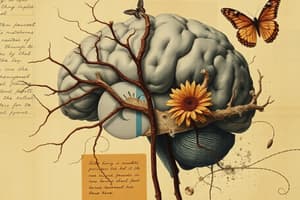Podcast
Questions and Answers
What common sensations can peripheral nerves carry to the brain?
What common sensations can peripheral nerves carry to the brain?
- Temperature, pressure, and pain (correct)
- Emotions and thoughts
- Balance and coordination
- Hunger and thirst
What symptom should a patient experiencing peripheral neuropathy notify their doctor about immediately?
What symptom should a patient experiencing peripheral neuropathy notify their doctor about immediately?
- Frequent headaches
- Arms or legs feeling heavy, numb, or tingling (correct)
- Increased appetite
- Feeling unusually thirsty
Which of the following is not a recommended safety measure for individuals with peripheral neuropathy?
Which of the following is not a recommended safety measure for individuals with peripheral neuropathy?
- Keeping a night light on in the bedroom
- Wearing shoes both indoors and outdoors
- Clearing stairs and hallways of objects
- Using sharp objects without caution (correct)
What might a doctor recommend to help protect a patient against peripheral neuropathy?
What might a doctor recommend to help protect a patient against peripheral neuropathy?
What is a common physical sensation associated with peripheral neuropathy?
What is a common physical sensation associated with peripheral neuropathy?
What is a suggested method to manage the symptoms associated with chemo brain?
What is a suggested method to manage the symptoms associated with chemo brain?
Which symptom is NOT typically associated with chemo brain?
Which symptom is NOT typically associated with chemo brain?
In managing foot health, when should a patient check their feet?
In managing foot health, when should a patient check their feet?
Which physical activity is recommended to help alleviate symptoms of chemo brain?
Which physical activity is recommended to help alleviate symptoms of chemo brain?
What is a common characteristic of chemo brain symptoms?
What is a common characteristic of chemo brain symptoms?
Flashcards are hidden until you start studying
Study Notes
Peripheral Neuropathy
- Neuropathy involves irritation or damage to nerves, affecting communication between the brain and peripherals like skin, muscles, and organs.
- Peripheral nerves convey sensations of temperature, pressure, and pain, while also controlling movement in limbs.
- Peripheral neuropathy occurs when these nerves struggle to communicate, leading to various symptoms.
- Common symptoms are heavy, numb, or tingling sensations in limbs, often described as feeling like "pins and needles."
- Patients may experience difficulty with mobility, such as tripping, falling, pain while walking, or trouble lifting feet or toes.
- Loss of dexterity may hinder tasks like picking up objects or using buttons effectively.
- Cold sensations in limbs and increased sensitivity to temperature changes are also reported.
- Immediate consultation with a doctor is advised if symptoms occur, as early treatment may prevent progression.
- Vitamin B Complex may be recommended to help protect against further nerve damage.
Patient Education and Prevention Strategies
- Wear gloves and warm socks, particularly in colder months, to maintain warmth and protect hands and feet.
- Always use shoes indoors and outdoors to safeguard against injury.
- Exercise caution when handling sharp objects, employing gloves during cleaning or repairs for additional protection.
- Ensure living areas are well-lit to prevent accidents, utilizing night lights for safer navigation during the night.
- Secure non-skid surfaces in showers and bathtubs to minimize fall risks.
- Keep paths, stairs, and halls clear of obstructions and mark steps with bright colors for visibility.
- Install handrails for extra support on stairs and taping down throw rugs can help avoid trips.
- Test water temperature with unaffected body parts before bathing or dishwashing to prevent burns.
- Regular foot checks are crucial to identify redness or sores that may go unnoticed due to reduced sensation.
"Chemo Brain" or Brain Fog
- Certain cancer treatments may lead to cognitive changes, commonly referred to as "chemo brain."
- The underlying causes of chemo brain remain unclear, but it varies from person to person, with some experiencing relief after treatment and others facing persistent effects.
- Symptoms include difficulties in concentration, memory issues, confusion with dates and appointments, misplacing items, and an inability to multitask effectively.
- Individuals might feel mentally slower than usual during this phase.
Coping Strategies for Chemo Brain
- Prioritize adequate rest and nutrition to support cognitive function.
- Engage in light physical activity to enhance overall well-being and mental clarity.
- Stay mentally active through reading, word games, and social interactions.
- Utilize memory aids, such as calendars and planners, to track important tasks and appointments.
- Establish a designated "memory station" for the consistent placement of essential items.
- Set audible reminders for medications and appointments on smartphones or watches to keep organized.
Studying That Suits You
Use AI to generate personalized quizzes and flashcards to suit your learning preferences.




